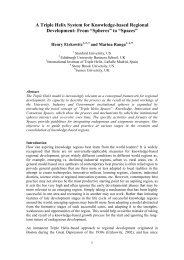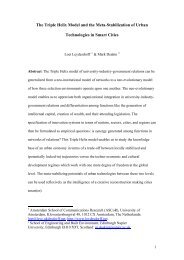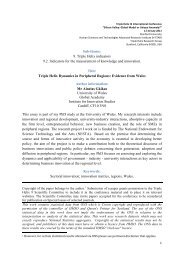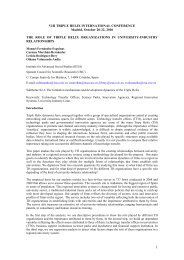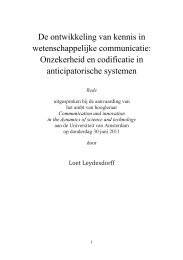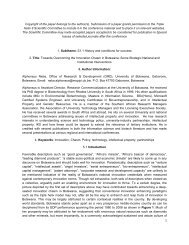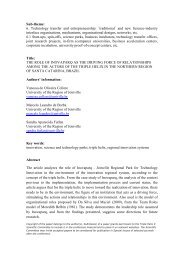- Page 4 and 5:
O-050IMPLICATION OF FIRMS’ LINKAG
- Page 6 and 7:
P-042Building Regional Competitive
- Page 8 and 9:
O-082Challenges for governmental ro
- Page 10 and 11:
W-07FAPERJ’S CHANGING ROLE IN SUP
- Page 12 and 13:
Research on intelligent products wi
- Page 14 and 15:
Selected References- Bercovitz, J.,
- Page 16 and 17:
References- CABRAL, R., DAHAB, S. (
- Page 18:
References- Acker, Joan (1992). Gen
- Page 21 and 22:
O-070The Role of the University and
- Page 23 and 24:
O-120Absorptive capacity and the de
- Page 25 and 26:
O-103Determinants of scientific int
- Page 27 and 28:
W-11TRIPLE HELIX in R&D&I - Researc
- Page 29 and 30:
Contributions and implicationsThe p
- Page 31 and 32:
O-130The Triple Helix balancing act
- Page 33 and 34:
O-059Research, facilitate, evaluate
- Page 35 and 36:
P-047Gendered structures in academi
- Page 37 and 38:
Strategic implicationsGiven the foc
- Page 39 and 40:
O-098The role of Tunisian universit
- Page 41 and 42:
ST-10Alliance Capability in Tunisia
- Page 43 and 44:
O-139Individual-level antecedents o
- Page 45 and 46:
P-008THE STATE OF TECHNOLOGICAL INN
- Page 47 and 48:
ST-04LINKAGES BETWEEN THE DEVELOPME
- Page 49 and 50:
P-009INTELLECTUAL PROPERTY - AN IMP
- Page 51 and 52:
O-106The multiple historical hermen
- Page 53 and 54:
O-113Triple Helix System: The Heart
- Page 55 and 56:
Implications of the FindingsBased o
- Page 57 and 58:
Results and ImplicationsAn enhanced
- Page 59 and 60:
Findings, Implications and Contribu
- Page 61 and 62:
References- Archibugi, D., B-A. Lun
- Page 63 and 64:
We construct a set of dependent var
- Page 65 and 66:
ResultsThe results show that (i) th
- Page 67 and 68:
FindingsThe foresight proceedings a
- Page 69 and 70:
O-079Universities and Economic Deve
- Page 71 and 72:
O-001TRIPLE HELIX MODEL TO CREATE G
- Page 73 and 74:
O-033PROMOTION OF THE ENTREPRENEURI
- Page 75 and 76:
O-086Innovation Challenges and Oppo
- Page 77 and 78:
O-085BEWARE OF THE RED QUEENTariq D
- Page 79 and 80:
P-017University cluster: Russian ex
- Page 81 and 82:
O-053The Triple Helix of Knowledge:
- Page 83 and 84:
O-131Forms and barriers in inter-fi
- Page 85 and 86:
O-011CONTRIBUTION OF UNIVERSITIES T
- Page 87 and 88:
References (some main references)-
- Page 89 and 90:
The entrepreneurial university mode
- Page 91 and 92:
Keywords: Local Innovation Systems
- Page 93 and 94:
O-056THE ROLE OF TRIPLE HELIX ORGAN
- Page 95 and 96:
O-095Sustainable Triple Helix exper
- Page 97 and 98:
O-009Interaction Between the Univer
- Page 99 and 100:
2002.Disponível em: http://www.cas
- Page 101 and 102:
Both companies operate within the o
- Page 103 and 104:
Reference- Abe, S. (1998) “Region
- Page 105 and 106:
1) The strong engagement and the su
- Page 107 and 108:
3 Researching focusTo demonstrate t
- Page 109 and 110:
FindingsThe general-model shows tha
- Page 111 and 112:
CHESBROUGH, H.; VANHAVERBEKE, W.; W
- Page 113 and 114:
This paper employs a multiple case
- Page 115 and 116:
O-081Entrepreneurial Intentions & M
- Page 117 and 118:
2.2. Reasons behind Scientific Mobi
- Page 119 and 120:
Surveys and empirical findings of p
- Page 121 and 122:
** 1.000 .053 .230 -.093 .355** .05
- Page 123 and 124:
N3 I am working on to create a larg
- Page 125 and 126:
P-005Management of Intellectual Pro
- Page 127 and 128:
O-005Innovation systems in Norwegia
- Page 129 and 130:
322.00Amita SahayaJennie Granat Tho
- Page 131 and 132:
W-23When Triple Helix UnravelsDenis
- Page 133 and 134:
P-041Climate for Innovation: a stud
- Page 135 and 136:
P-056"Hands on for a sustainable ch
- Page 137 and 138:
MethodologyWe try to identify the t
- Page 139 and 140:
O-057Unraveling a large-scale innov
- Page 141 and 142:
P-011Inside the Pandora box of the
- Page 143 and 144:
O-042Interaction between Universiti
- Page 145 and 146:
P-048Government and public policy i
- Page 147 and 148:
Contribution and implicationsOur re
- Page 149 and 150:
Recombination of three sub-dynamics
- Page 151 and 152:
REFERENCES- Audretsch, D. B., B. Bo
- Page 153 and 154:
Our analysis shows that the suppose
- Page 155 and 156:
7. ReferencesChudnovsky, D., Lopez,
- Page 157 and 158:
FindingsOwnership trends reveal thr
- Page 159 and 160:
O-141Strategic openness for success
- Page 161 and 162:
ReferencesChaminade, C. and Edquist
- Page 163 and 164:
Main References:1. Etzkowitz H., Th
- Page 165 and 166:
• Findings,In the analysis of the
- Page 167 and 168:
O-026Collaborative Innovation in Tr
- Page 169 and 170:
Impact and ContributionThis pilot s
- Page 171 and 172:
ReferencesAsheim, B., Benneworth, P
- Page 173 and 174: They must work on each of the next
- Page 175 and 176: P-015A discussion on the Triple Hel
- Page 177 and 178: O-125Technology Transfer from Unive
- Page 179 and 180: References:Daghfous, A., Michael, H
- Page 181 and 182: Norwegian processing industry speci
- Page 183 and 184: ReferencesCooke, P. and Morgan, K.
- Page 185 and 186: Facilitating linkagesLester (2003)
- Page 187 and 188: arely oriented explicitly to a part
- Page 189 and 190: Consulting/servicingFaculty consult
- Page 191 and 192: O-047Do foreign authors strengthen
- Page 193 and 194: O-007Technological collaboration an
- Page 195 and 196: O-094Academic entrepreneurship in d
- Page 197 and 198: P-021Complementary or substitution
- Page 199 and 200: O-097Software clusters in Brazil: a
- Page 201 and 202: ST-14Evaluation and dissemination o
- Page 203 and 204: References:- Amin, A. and Roberts,
- Page 205 and 206: P-002Doing gender in Sweden’s inn
- Page 207 and 208: O-054Triple Helix Relations as Cons
- Page 209 and 210: P-006Why are WE not more Attractive
- Page 211 and 212: W-06University-industry-government
- Page 213 and 214: ST-07The Architecture of Innovation
- Page 215 and 216: O-105The role of higher education i
- Page 217 and 218: Contributions and ImplicationBy app
- Page 219 and 220: References:- Colciencias 2008. Colo
- Page 221 and 222: CONTRIBUTIONS AND IMPLICATIONSWe be
- Page 223: - experts that were involved in the
- Page 227 and 228: - University-Industry- Government I
- Page 229 and 230: - ETZKOWITZ, H.; LEYDESDORFF, L. Un
- Page 231 and 232: REFERENCES- Borrell-Damian, L (2009
- Page 233 and 234: Contributions and implicationsThe u
- Page 235 and 236: O-134The determinants of entreprene
- Page 237 and 238: O-091Caring for the business platfo
- Page 239 and 240: P-054"I do not know if this is a go
- Page 241 and 242: O-111JUMPSTARTING THE TRIPLE HELIX
- Page 243 and 244: References- Coase, R. (1988). The F
- Page 245 and 246: References- BAIN, J. S. Industrial
- Page 247 and 248: References- Clark, A. (2004). Evalu
- Page 249 and 250: Reference- Etzkowitz Henry, MIT and
- Page 251 and 252: W-05Is industry-university interact
- Page 253 and 254: O-021Motivation, obstacles and stra
- Page 255 and 256: P-043Webometrics analysis of public
- Page 257 and 258: O-093STI-DUI Innovation Profiles an
- Page 259 and 260: O-118Technological Parks in Mexico:
- Page 261 and 262: References:- Berman, E. P. (2008) W
- Page 263 and 264: REFERENCES- BALLON, P.; PIERSON, J.
- Page 265 and 266: - with foreign actors concerning di
- Page 267 and 268: incubation houses operating in deve
- Page 269 and 270: P-045Roles of the 3rd Strand of the
- Page 271 and 272: P-007NON-PROFIT ORGANIZATIONS IN ST
- Page 273 and 274: O-045Empowering a State's Developme
- Page 275 and 276:
O-107Academic Research Groups and T
- Page 277 and 278:
ST-06University Patenting and Licen
- Page 279 and 280:
W-28Total Control? The gendering of
- Page 281 and 282:
O-015Stages of Development of Enter
- Page 283 and 284:
W-21To Join or Not to Join: Individ
- Page 285 and 286:
P-055Academic entrepreneurship in t
- Page 287 and 288:
References:- Admade, M.T. and Romer
- Page 289 and 290:
'Technologies for the marketing of
- Page 291 and 292:
References- Audretsche, D.B. (1998)
- Page 293 and 294:
P-013Determinants of university-ind
- Page 295 and 296:
O-051“COMMUNICATION CHANNELS AMON
- Page 297 and 298:
O-041Towards a Knowledge Society:Ex
- Page 299 and 300:
P-036Research and Innovation privat
- Page 301 and 302:
P-026AGROPOLIS DEL NORTE : a local
- Page 303 and 304:
- Etzkowitz, H, 2004, The evolution
- Page 305 and 306:
attitude and a scientific approach.
- Page 307 and 308:
models for conduct his/hers process
- Page 309 and 310:
terms of the addition of a fourth s
- Page 311 and 312:
Desarrollo and Global Entrepreneurs
- Page 313 and 314:
- Ehikhamenor, F.A., (2003). Intern
- Page 315 and 316:
References:- Roberts E. B. and Eesl
- Page 317 and 318:
some evidence that there might be p
- Page 319 and 320:
universities in the "knowledge soci
- Page 321 and 322:
Feldman (2006), and are not conside
- Page 323 and 324:
W-19Fostering Team Science:Innovati
- Page 325 and 326:
O-025The dynamic evolution of knowl
- Page 327 and 328:
O-055The evolvement of triple helix
- Page 329 and 330:
W-41Resource Mobilization and Busin
- Page 331 and 332:
faculties of Engineering, Science a
- Page 333 and 334:
O-002Patterns of the Innovation Eco
- Page 335 and 336:
Bibliographic references- ETZKOWITZ
- Page 337 and 338:
References- Bercovitz, J, and Feldm
- Page 339 and 340:
References- Boden, Mark e Miles, Ia
- Page 341 and 342:
References- Gibbons M., Limoge C.,
- Page 343 and 344:
References- Brimble, P. & Doner, R.
- Page 345 and 346:
O-101HOW MUCH THE ROLE OF THE OTHER
- Page 347 and 348:
O-090PUBLIC PROGRAMME CONTEXTS AND
- Page 349 and 350:
O-075The effectiveness of universit
- Page 351 and 352:
O-076Technology Transfer in a Publi
- Page 353 and 354:
O-052Between Myth and Reality: Deve
- Page 355 and 356:
O-017Characterising Triple Helix li
- Page 357 and 358:
P-004STUDY OF THE IMPACT OF EXTERNA
- Page 359 and 360:
O-140Analysing entrepreneurial arch
- Page 361 and 362:
O-104The co-evolvement of local dev
- Page 363 and 364:
P-031Context Factors Moderating the
- Page 365 and 366:
P-019Conception of the Development
- Page 367 and 368:
O-088Key Ingredients of Innovation:
- Page 369 and 370:
Methodology and research designData
- Page 371 and 372:
References:- Chesbrough, H. (2003).
- Page 373 and 374:
At present, government policy in Th
- Page 375 and 376:
O-092Increase in Effectiveness of T
- Page 377 and 378:
O-115Analysis of the conception, mo
- Page 379 and 380:
O-036A PROPOSAL TO INTEGRATE THE UN
- Page 381 and 382:
O-039NC State’s Centennial Campus
- Page 383 and 384:
O-068The Impacts of Seed Grants as
- Page 385 and 386:
O-123 Technology Transfer Process i
- Page 387:
ST-15 The Critical Constructivism o



